
The ODROID-M1 is a single board computer with a wide range of useful peripherals developed for use in a variety of embedded system applications.
To achieve this goal, we have developed various hardware accessories and device driver software over the past 10 months. In addition, RK3568B2, the core brain of ODROID-M1, is considered suitable for true embedded application use as the SoC manufacturer (Rockchip) guarantees supply for the next 15 years. Therefore, we expect we can supply the ODROID-M1 boards to our important B2B customers until the year 2036 or beyond.
Let’s take a look at the main features and peripherals of ODROID-M1:-
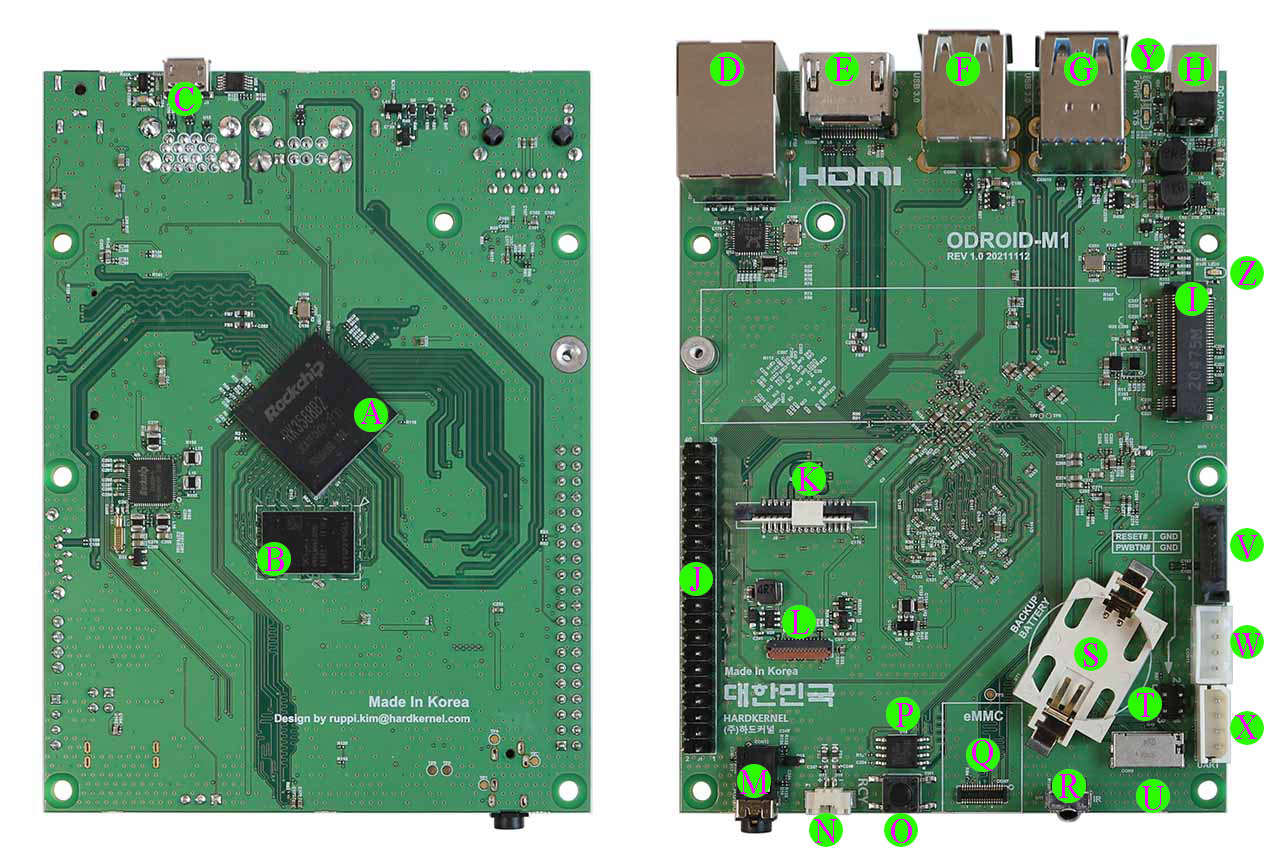
A | Rockchip RK3568B2 CPU | N | 1 x Mono Speaker Output (1.3W at 8Ω load) |
B | LPDDR4 RAM | O | 1 x Power Button 1 x SPI Boot Select Switch |
C | 1 x Micro USB2.0 Device only | P | 1 x SPI Flash 16MiB |
D | 1 x RJ45 Ethernet Port (10/100/1000) | Q | 1 x eMMC Module Socket |
E | 1 x HDMI 2.0 | R | 1 x IR Receiver |
F | 2 x USB 2.0 | S | 1 x RTC Backup Battery Holder |
G | 2 x USB 3.0 | T | 1 x Jumper |
H | 1 x DC Power Jack | U | 1 x Micro SD Slot |
I | 1 x M.2 NVMe M-Key PCIe3.0 2-Lane | V | 1 x SATA3 |
J | 40 x GPIO Pins | W | 1 x SATA Power (5volt only) |
K | 1 x MIPI CSI 2Lane | X | 1 x UART for System Console |
L | 1 x MIPI DSI 4Lane | Y | 2 x System LED Indicators |
M | 1 x 3.5mm Headphone Jack | Z | 1 x M.2 LED Indicator |
The CPU has four ARM Cortex-A55 processors with low power consumption and high efficiency operation at 2Ghz. The CPU and GPU performance is quite similar to our ODROID-C4.
A larger 8GB of LPDDR4 DRAM Memory is available while there is also a 4GB model for reduced cost.
Petitboot pre-installed into the on-board 16MiB of SPI-Flash Memory helps manage various OS and kernel versions easily and supports booting from microSD, eMMC, NVMe, SATA, and USB storage devices. In addition, since on-line OS installation using a network is possible, the cumbersome procedure of downloading and flashing an OS image is dramatically reduced.
A standard size 22mm x 80mm M.2 NVMe storage device can be directly installed on the ODROID-M1 board. The M.2 connector has PCIe 3.0 2-lane configuration which can deliver a blazing fast 1600MB/sec of sequential access performance. Note that M.2 SATA storage devices can not be used. The M.2 slot supports only a PCIe interface (M-Key).
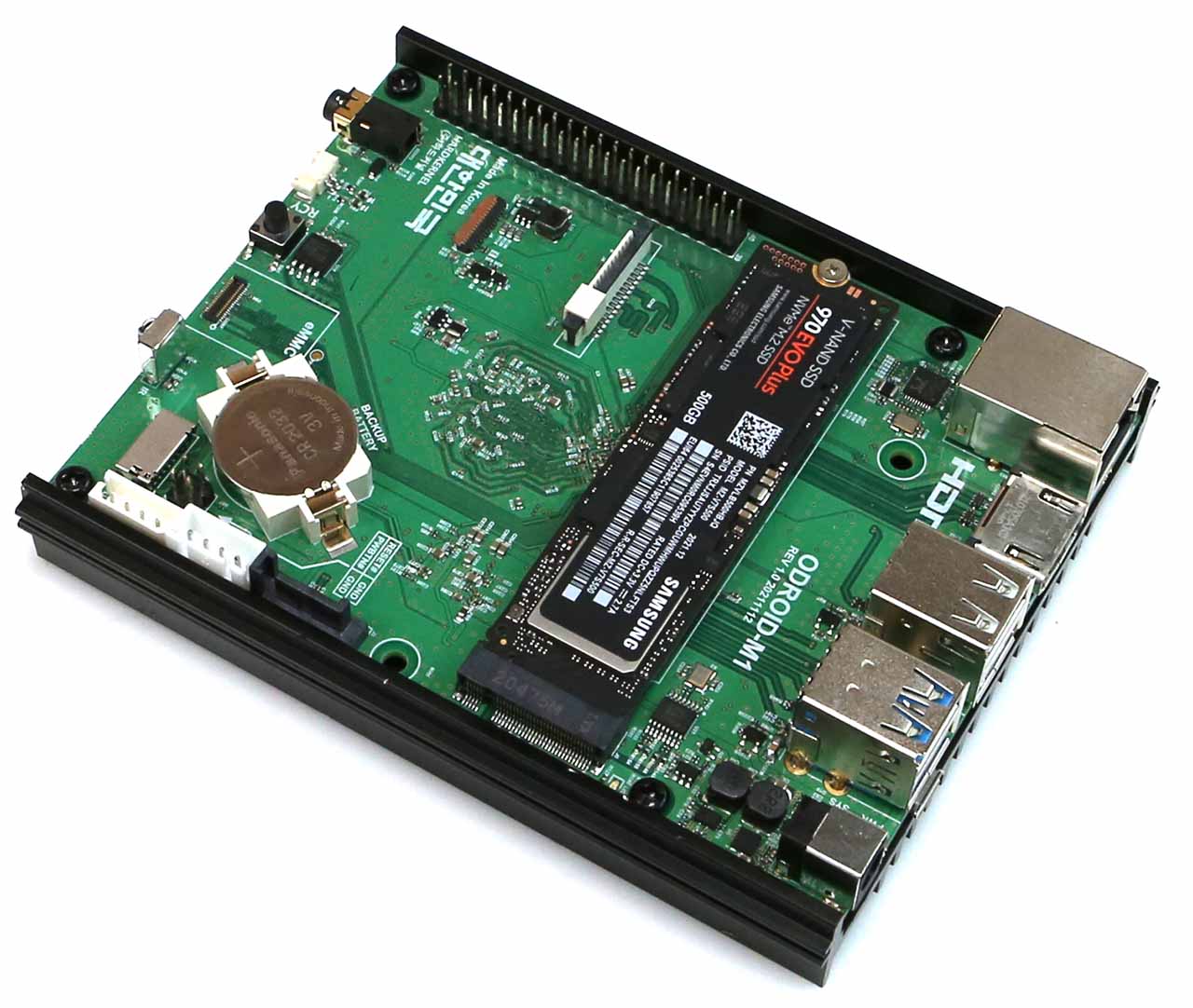
Benchmark | ODROID-M1 (PCIe 3.0 x 2) | RPI CM4 (PCIe 2.0 x 1) |
fio 1M sequential read | 1646 MB/s | 416 MB/s |
iozone 1M random read | 1049.13 MB/s | 210.97 MB/s |
iozone 1M random write | 1163.95 MB/s | 188.70 MB/s |
iozone 4K random read | 43.73 MB/s | 14.77 MB/s |
iozone 4K random write | 96.90 MB/s | 25.38 MB/s |
A single native (non-USB) SATA 3.0 port is provided for use with a 2.5inch HDD or SSD NAND Memory storage device. This SATA interface delivers near 500MB/s of sequential access. The SATA Mount and Cable Kit contains a SATA Data cable, a SATA Power cable, and a mount plate with some support screws. However, since the SATA power port doesn’t have a 12Volt power rail, a separated external 12Volt SATA power supply is required to use a 3.5inch HDD.
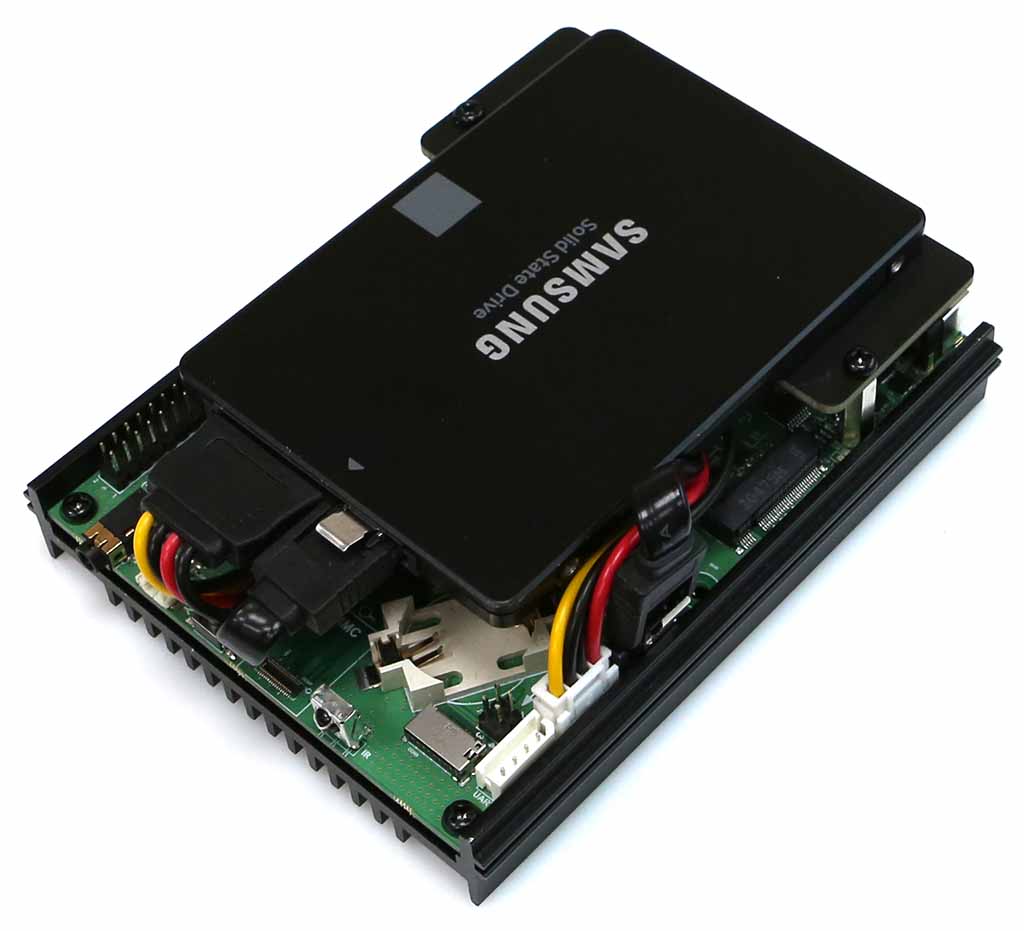
The four-lane MIPI-DSI port can be directly connected to a LCD panel. The ODROID-Vu8M kit with a 8inch 800×1280 wide viewing angle LCD and capacitive multi-touch screen is an available option. If you assemble the ODROID-M1 single board computer on the rear side of the Vu8M kit, you can easily implement a Human-Machine-Interface (HMI) device.
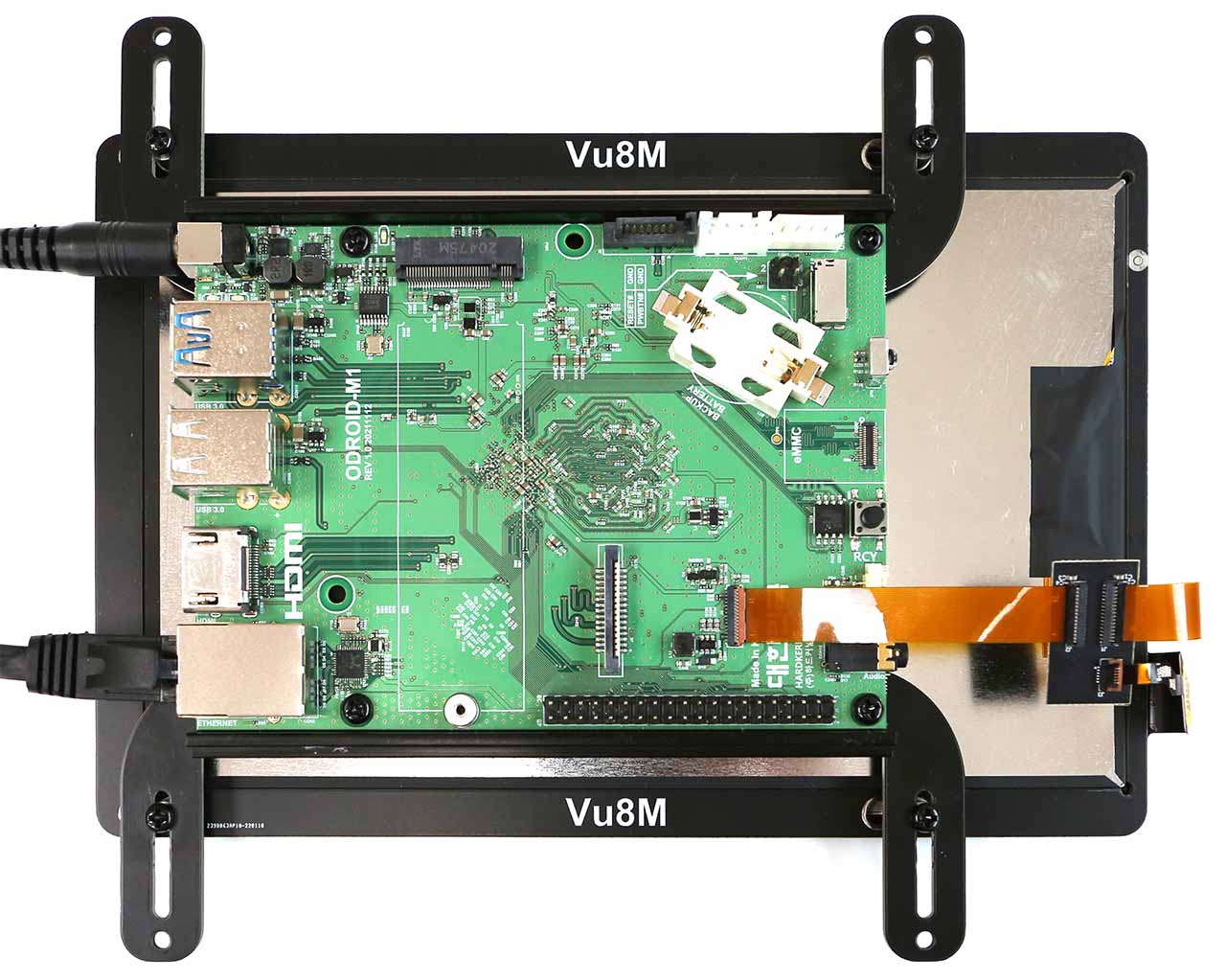
The two-lane MIPI-CSI port can be directly connected to a camera sensor module. Our M1 MIPI-CSI Camera Kit has an OV5647 sensor chip which can capture up to 5 Mpixel images and 720p/30fps video streaming. You can get reasonably good imaging whether it is in the daytime or at night thanks to the automatically switchable IR-Cut filter and two IR Lights. Realtime image inputs from the MIPI-CSI port can be widely used for Machine-Learning applications.
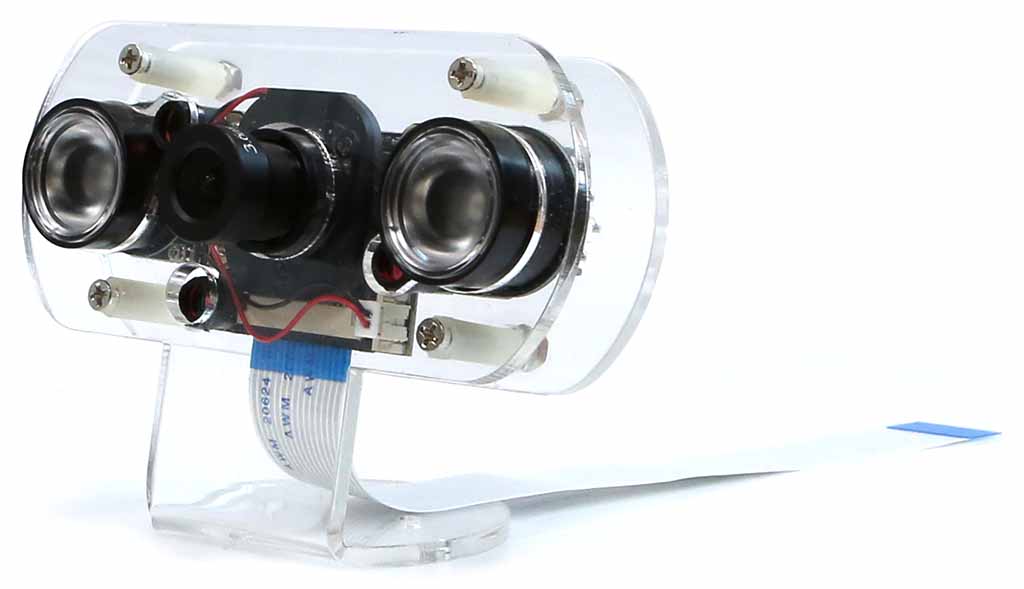
A sleek and cool blue M1 Metal Case Kit is an available option to protect your ODROID-M1 board. The metal cover is made with aluminum extrusion that has an abrasive blasted surface texture and anodized blue finish. It can be securely docked to the ODROID-M1 heatsink frame via sliding slot. The front and rear side covers were made with gold plated PCBs.
Specifications
| FORM FACTOR | Board Dimensions: 90mm x 122mm x 16mm Heatsink Dimensions: 100mm x 123mm x 19mm Weight: 253 g including heatsink |
|---|---|
| PROCESSOR | Rockchip RK3568 Processor L1 instruction cache: 32 KB, 4-way set associative (128 sets), 64 byte lines, shared by 1 processor L1 data cache: 32 KB, 4-way set associative (128 sets), 64 byte lines, shared by 1 processor L3 data cache: 512KB , 16-way set associative (512 sets), 64 byte lines, shared by 4 processorsQuad-Core Cortex-A55 (1.992GHz) ARMv8-A architecture with Neon and Crypto extensions Mali-G52 MP2 GPU with 4 x Execution Engines (650Mhz) |
| NPU | 0.8Tops@INT8, integrated high-performance AI accelerator RKNN NPU Supports one-click switching of Caffe/TensorFlow/TFLite/ONNX/PyTorch/Keras/Darknet |
| MEMORY | 4 or 8GiB LPDDR4 with 32-bit bus width Data rate: 3120 MT/s, up to 1,560MHz |
| STORAGE | 1 x eMMC slot 1 x Micro SD slot (DS/HS mode up to UHS-I SDR104) 1 x NVME M.2 SSD (PCIe 3.0 x 2) 1 x SATA3.0 |
| NETWORKING | 1 x GbE LAN ports (RJ45, supports 10/100/1000 Mbps) – Realtek RTL8211F (Ethernet transceiver) – LED indicators * Green LED: Flashing by data traffics at 100Mbps connection * Amber LED: Flashing by data traffics at 1000Mbps connection |
| VIDEO | 1 x HDMI 2.0 (up to 4K@60Hz with HDR, EDID) 1 x MIPI-DSI (works with 800 x 1280 LCD) |
| AUDIO | 1 x 3.5mm phone jack 1 x mono speaker output 1 x HDMI sound |
| EXTERNAL I/O | 2 x USB 2.0 host port 2 x USB 3.0 host port (or 1 x USB 3.0 host + 1 x USB 2.0 OTG port) 1 x Debug serial console (UART, 1.5Mbps N81) 1 x SATA Connector 1 x MIPI-CSI Camera Interface (15 pin) 1 x MIPI-DSI LCD Interface (31 pin) 1 x DSI |
| OTHER FEATURES | IR receiver for remote controller RTC and backup battery holder (to keep time and date for several months without main power input) System LED Indicators: – Red (POWER) – Solid light when DC power is connected – Blue (ALIVE) – Flashing “heartbeat” while Kernel is running. Solid On when in the u-boot stage. |
| POWER | 1 x DC jack : outer (negative) diameter 5.5mm, inner (positive) diameter 2.1mm DC input : 12V ~ 15.5V – DC 12V/2A power adapter is recommended – IDLE : ≃ 1.25W – CPU Stress : ≃ 4.44W (Performance governor) – Power Off : ≃ 0W |
We recommend powering the ODROID-M1 with a good quality 12V/2A power adapter.
Whats in the box:
ODROID-M1 with 8GByte RAM [81001]
- Brand: Hard Kernel
- Product Code: ODROID-M1 with 8GByte RAM [81001]
- Availability: In Stock
-
128.84€
- Ex Tax: 107.37€

![ODROID-M1 with 8GByte RAM [81001] ODROID-M1 with 8GByte RAM [81001]](https://www.odroid.co.uk/image/cache/catalog/Odroid-M1/M1-HERO-500x500.jpg)
![ODROID-M1 with 8GByte RAM [81001] ODROID-M1 with 8GByte RAM [81001]](https://www.odroid.co.uk/image/cache/catalog/Odroid-M1/M1-DIAGONAL-74x74.jpg)
![ODROID-M1 with 8GByte RAM [81001] ODROID-M1 with 8GByte RAM [81001]](https://www.odroid.co.uk/image/cache/catalog/Odroid-M1/M1-M1SATA-74x74.jpg)
![ODROID-M1 with 8GByte RAM [81001] ODROID-M1 with 8GByte RAM [81001]](https://www.odroid.co.uk/image/cache/catalog/Odroid-M1/M1-WITH-SSD-74x74.jpg)
![ODROID-M1 with 8GByte RAM [81001] ODROID-M1 with 8GByte RAM [81001]](https://www.odroid.co.uk/image/cache/catalog/M1caseOlivegreenA-510x361-500x500-74x74.jpg)